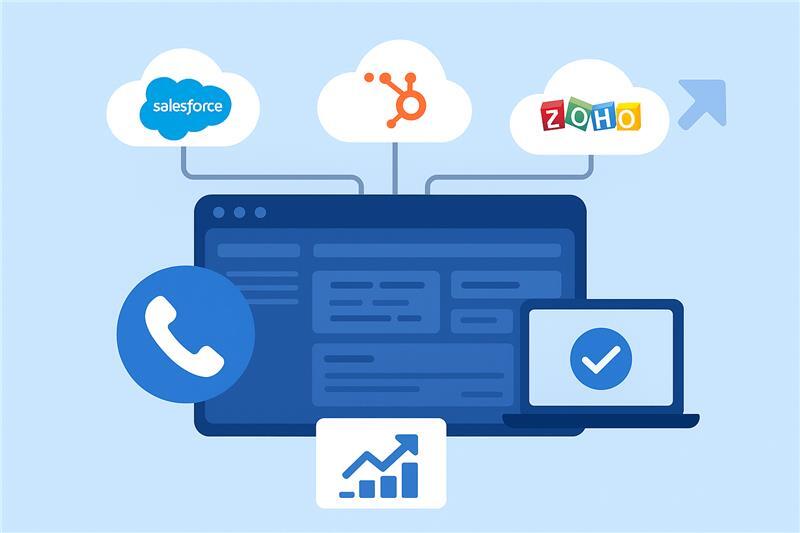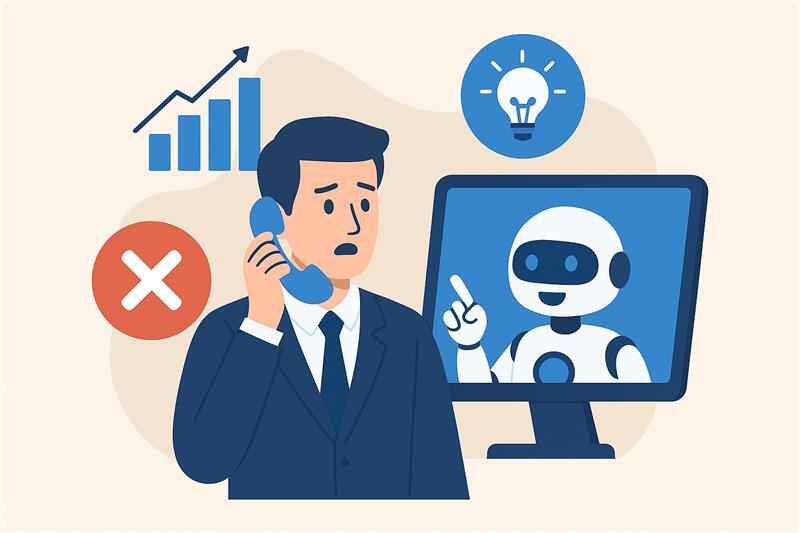
Exploring the Impact of Natural Language Processing in Improving Sales Call Quality
Mastering Conversation with NLP
Understanding the customer voice has long been a challenge for businesses. Traditional methods for call analysis are severely limited. Randomly sampling calls captures less than 2% of interactions, giving an incomplete picture.1 Old transcription systems with low accuracy make it difficult to extract data.
With competition intensifying, the stakes have never been higher. To succeed, sales teams need more than just charm and persistence; they need insights.
Enter Natural Language Processing (NLP), a powerful subset of artificial intelligence that is revolutionizing sales and marketing. NLP enables computers to understand and process human language, transforming the way sales teams operate.
By analyzing customer conversations, NLP can extract valuable insights leading to more personalized interactions, identify trends, and improve sales strategies. Additionally, AI-driven analysis enables the measurement of customer satisfaction with each interaction.
The impact of NLP is profound. Companies implementing NLP solutions are seeing cost savings of 20-30%, improvements in customer satisfaction scores of 10% or more, and strengthened sales performance.
.png)
NLP Sales Automation: Revolutionizing Call Quality
By automating tasks like call transcription and data analysis, NLP increases sales efficiency by freeing up sales reps to focus on building relationships and closing deals. Key benefits include:
- Real-Time Transcription and Analysis:
- Accurate transcriptions: NLP-powered tools can convert spoken language into text, providing a detailed record of sales calls.
- Sentiment analysis: By detecting emotional cues, sales reps can adapt their approach to match the customer's mood.
- Keyword extraction: Identifying key points and topics can help focus the conversation and address customer concerns effectively.
- Sales Coaching and Feedback:
- Performance evaluation: NLP can analyze call recordings to identify strengths and weaknesses in sales reps' performance.
- Real-time coaching: By providing immediate feedback on speech patterns, language usage, and objection handling, NLP can enhance sales skills.
- Identifying best practices: Analyzing successful calls can help identify sales techniques that consistently lead to conversions.
- Improved Customer Experience:
- Personalized interactions: NLP can help tailor sales pitches to individual customer needs and preferences.
- Faster issue resolution: By understanding customer problems more accurately, sales reps can provide quicker solutions.
- Increased customer satisfaction: By delivering exceptional customer experiences, NLP contributes to building long-term relationships.
- Data-Driven Insights:
- Sales performance analysis: NLP can identify trends in customer conversations, helping to optimize sales strategies.
- Product feedback: By analyzing customer language, businesses can gain insights into product strengths and weaknesses.
- Competitive intelligence: Understanding how competitors are positioned can inform product development and sales strategies
- Sentiment Analysis:
- Detect emotional cues: NLP can detect emotions such as frustration or excitement, to help sales reps adapt their approach accordingly.
- Emotional intelligence: This fosters stronger customer relationships and improves overall satisfaction.
- Sales Intelligence:
- Conversation Intelligence: NLP, as a core component of conversation intelligence, can help organizations understand customer needs, preferences, and pain points.
- Drive Maximum Sales Performance: This information can be used to refine sales messaging, target cold email lead generation with a data-driven strategy, improve product development and marketing strategies.
- Compliance and Risk Management:
- Identify sensitive information: In highly regulated industries, NLP can help ensure compliance by identifying sensitive information, detecting potential risks, and flagging suspicious activity.
- Enhance company reputation: Mitigating compliance risks protects both the customer and the company.
Sectors Leading the Way with NLP Integration
Several sectors stand to benefit significantly from the implementation of NLP in sales:
1. Customer-Centric Industries
- Telecommunications: Analyzing customer interactions to identify pain points, improve churn rates, and enhance customer satisfaction.
- Financial Services: Understanding customer sentiment towards products and services, detecting fraud, and providing personalized financial advice.
- Healthcare: Analyzing patient interactions to improve care delivery, identify potential risks, and enhance patient experience.
2. Complex Sales Cycles
- Technology: Understanding complex product features and customer needs to tailor sales pitches effectively.
- Enterprise Software: Analyzing customer interactions to identify upselling and cross-selling opportunities.
- Industrial Equipment: Utilizing NLP to understand industry-specific terminology and customer requirements.
3. High-Volume Sales
- E-commerce: Personalizing product recommendations, improving customer service through chatbots, and optimizing marketing campaigns.
- Retail: Analyzing customer feedback to enhance product offerings and improve in-store experiences.
- Travel and Hospitality: Understanding customer preferences to tailor travel packages and improve customer satisfaction.
NLP in Marketing and Sales: Salesforce [Example]
Salesforce, a top CRM software, has added NLP to its sales tools to greatly improve sales efficiency and effectiveness.
Salesforce developed "Einstein Voice" utilizing NLP technology. This tool enables sales teams to use natural language commands to interact with their CRM data. This feature enables sales representatives to quickly update records, schedule meetings, and get real-time insights without manual data entry.
NLP also powers sentiment analysis within Salesforce's platform, allowing sales teams to gauge customer emotions and tailor their approaches accordingly.
As a result, Salesforce users have seen:
- a reduction in administrative tasks, enabling sales teams to focus more on closing deals and engaging with customers.
- improved sales forecasting, better customer interactions, and a more streamlined sales process overall.
This case demonstrates how NLP can be a transformative tool in enhancing sales operations and driving business growth.
NLP: Challenges and Considerations
While NLP offers immense potential, it's essential to address certain challenges:
- Data privacy: Handling customer data responsibly is crucial.
- Accuracy: NLP models must be continuously trained to improve accuracy.
- Human element: While NLP provides valuable insights, human judgment is still essential for making informed decisions.
- Lack of multilingual proficiency: NLP research mainly focuses on English and a few other popular languages, neglecting multilingual proficiency. With approximately 7,000 different languages, addressing language diversity is crucial to benefit a more inclusive global audience. NLP is also limited in capturing linguistic and cultural nuances that vary significantly across languages.3
However, the benefits far outweigh the challenges. As NLP technology continues to advance, we can expect even more sophisticated applications in sales.
Invest in NLP: Future-Proof Your Business
The NLP market is expected to grow significantly, with a 40.4% annual growth rate from 2023 to 2030. This growth is driven by several factors.
- Advancements in Text Analysis: Improved computer programs are making it easier to analyze large amounts of text data.
- Demand for Streamlined Business Operations: Businesses are increasingly seeking solutions to improve efficiency and customer experience.
- Cloud-Based NLP Solutions: The growing adoption of cloud computing provides cost-effective and scalable NLP solutions.
- Importance of Predictive Sales Analytics: Businesses are recognizing the value of NLP in identifying business opportunities and mitigating risks.
- Generative AI for sales is enabling the automatic creation of human-like text for innovative applications.
NLP is essential for contact centers, and organizations that don't leverage this technology may lag behind their competitors.
Ready to elevate your sales strategy with artificial intelligence?
NLP is a powerful tool that can significantly enhance sales call quality. By leveraging its capabilities, sales organizations can unlock new opportunities, improve efficiency, and ultimately achieve greater success.
Harness the power of NLP. Start your journey today!
Frequently Asked Questions (FAQs)
1. What is NLP in sales?
NLP is the use of artificial intelligence to understand and process human language in sales interactions.
2. How does NLP improve sales calls?
NLP analyzes sales calls, providing insights into customer sentiment, agent performance, and sales process effectiveness.
3. Can NLP help with sales forecasting?
Yes, NLP can analyze historical sales data and customer interactions to predict future sales trends.
4. How does NLP enhance customer experience?
NLP-powered chatbots and virtual assistants provide quick responses and personalized interactions, improving customer satisfaction.
5. What are the challenges of implementing NLP in sales?
Data privacy, model accuracy, and integration with existing systems are key challenges.
6. How can NLP be used for sales enablement?
NLP can analyze best-performing calls to identify effective sales techniques and create training materials.
7. Is NLP expensive to implement?
NLP costs vary based on complexity and scale. Cloud-based solutions offer more affordable options.
8. Can NLP help with sales coaching?
Yes, NLP provides data-driven insights for targeted coaching, helping reps improve performance.
9. How can an NLP-powered revenue intelligence platform drive sales?
NLP-powered revenue intelligence platforms drive sales by transforming raw data into actionable insights. By analyzing customer interactions, these platforms uncover hidden patterns, predict sales outcomes, and optimize sales strategies. This data-driven approach empowers sales teams to make informed decisions, improve efficiency, and ultimately boost revenue.

.png)

